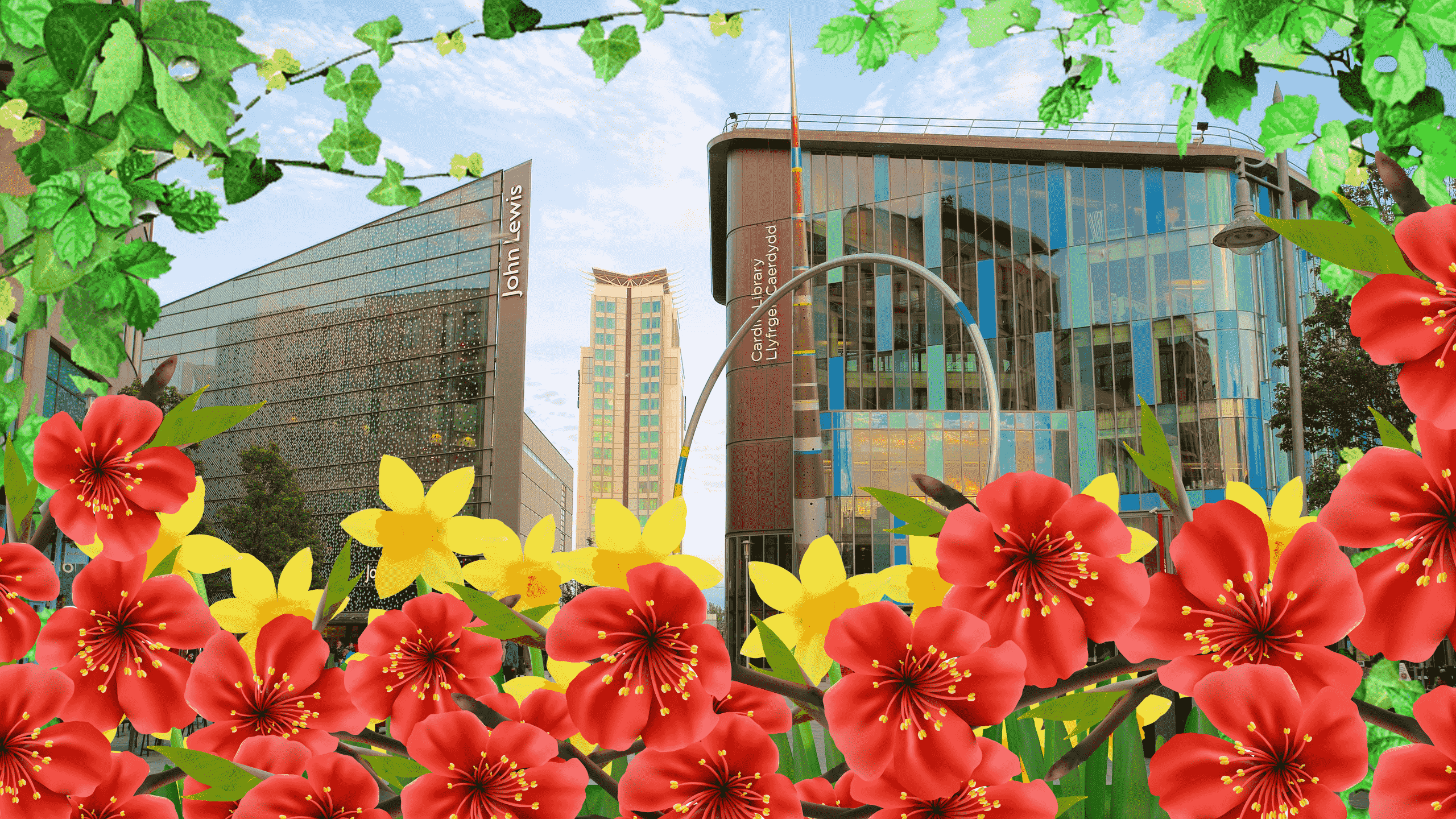Cardiff is a green city, but we may not be taking full advantage of nature’s health benefits
WELLBEING is a balance between comfort and adventure, belonging and freedom. These feelings cannot be learned, counselled or prescribed.
Wellbeing comes from life. In spite of all the amazing progress of modern healthcare, the happiest and healthiest lifestyle may simply require us to spend more time outdoors.
There is a reason why spending time outside feels like common sense. Green is at the centre of our visible spectrum, which makes it the most natural colour (literally) to perceive. Sunlight is our main source of Vitamin D, which supports our muscles, bones and teeth. Fresh air circulates better than its stale indoor imitator and contains a higher proportion of oxygen, which boosts the production of white blood cells and improves focus.
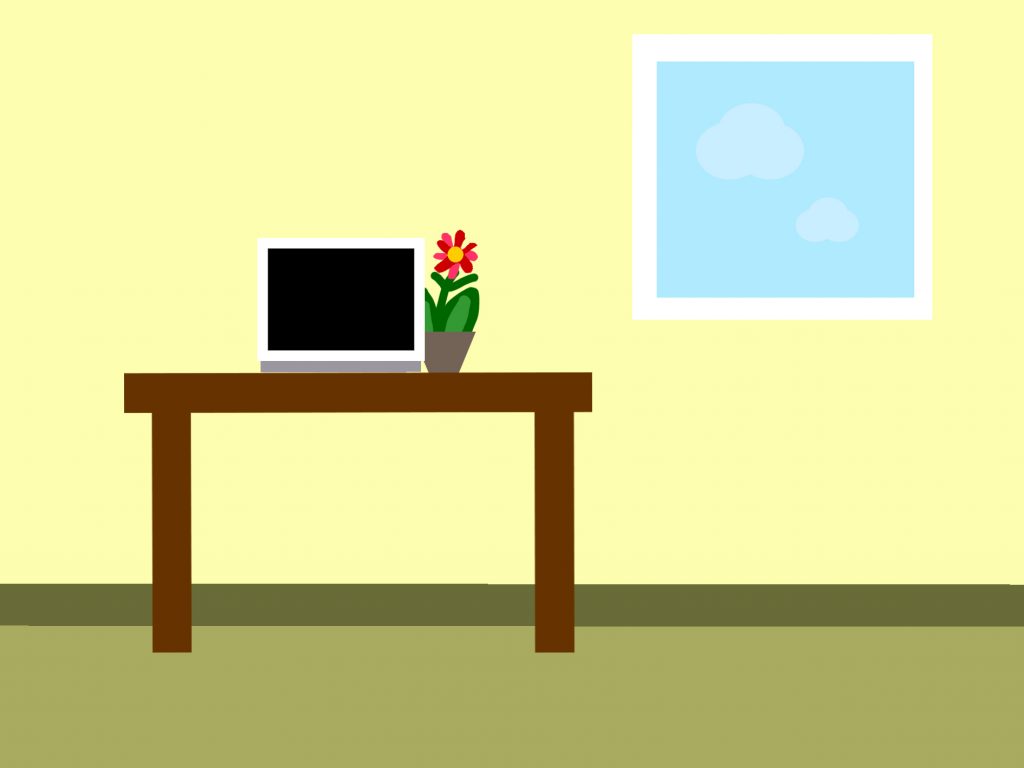
The indoor life is a product of the industrial age: factories, schools and insulated homes. The sedentary lifestyle is even newer. It is no wonder that evolution has not yet caught up.
COVID lockdowns offered an extreme, twisted version of modern life. Gardens were blessings. Taking the dog for a walk was a luxury. We longed for the outdoors when we could not have it. When we are busy with family, and work, and everything else, though, something about modern life makes us forget about Mother Nature.
Modern life might not be so far removed from the lockdown dystopia as we would like to think. A 2019 study (pre-pandemic) found that most children spent less than an hour a day outdoors. Office workers did not fare much better: busy lives, bound indoors – a bed, a car, an office and so on.
Feeling “trapped inside the same four walls every day” was part of the reason that Ryan Parker, 21, quit his job as a waiter and became a self-employed gardener. Working outdoors, he enjoys a much greater variety of work and naturally a feeling of freedom. Being able to observe his progress in the real world is another perk of the job, Ryan says.
Ryan admits the winter weather can make his job less comfortable but that it adds to the sense of gratification which so many people miss when working indoors.
“Everything is cold and wet but as long as you come prepared, it’s fine,” he reckons. “Sometimes the rain seems worse when you’re sat inside with a coffee.”
Gardeners and other open-air workers are lucky in that their time outdoors is built into work. The average full-time employee in the UK spends more than half of their week sleeping and working, which leaves a limited amount time for travel, family time, maintaining the house and everything else.
It is easy to see how the outdoors can become a casualty of modern life.
Finding the time and place is particularly challenging for those without a garden: people living in apartments, crowded areas and rented homes.
The following map, based on data from the Office for National Statistics, shows that gardens are rarer in more deprived areas of Cardiff. Fewer than half of homes in student-dominated Cathays South have access to a garden, whether private or shared. The fraction falls to one in four in Cardiff Bay.
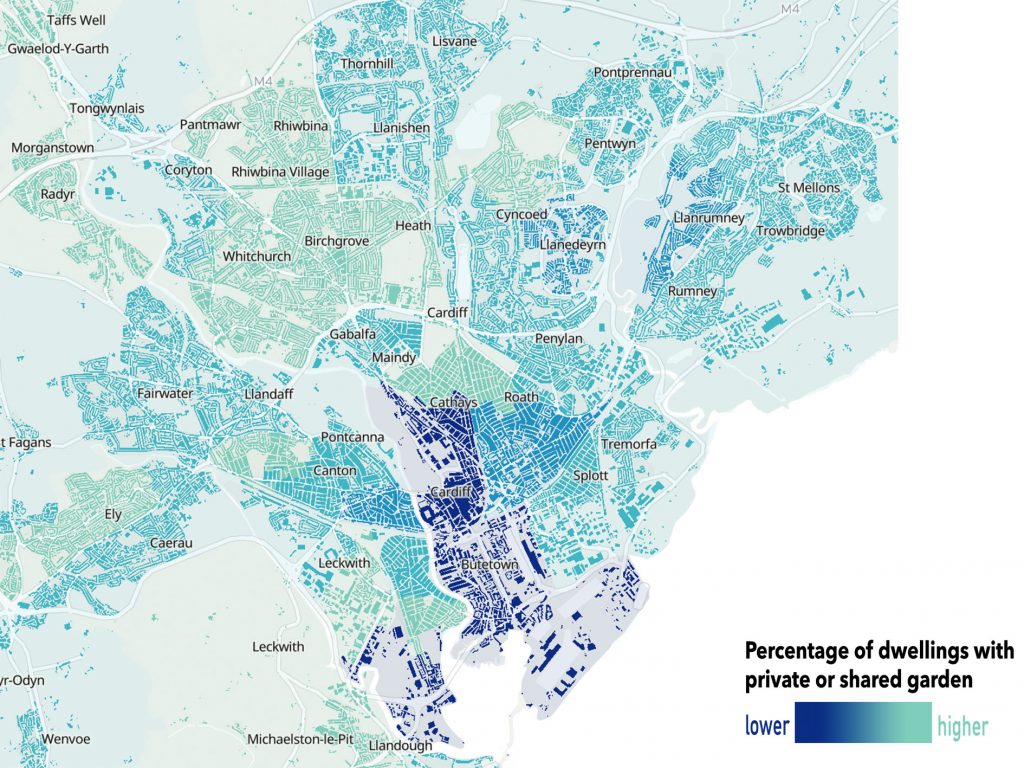
As long as there are people without gardens at home, it is up to local authorities to ensure access to nature for all of us.
“The pandemic really brought to the fore just how valuable our parks, green spaces and allotments are for people’s health,” says Julie Sangani, Cardiff Council cabinet member for public health.
“I’ve no doubt they were a life saver for many people.”
The council’s stewardship is set to become harder as it faces historic budget cuts from central government. It is not a question of if local services will suffer, but which ones and how bad.
“This administration has always done its best to protect our parks and green spaces,” Coun Sangani insists. “Clearly, we face an incredible budget challenge next year… the largest in-year gap we have ever faced. But it’s too early to discuss what that might look like across our different services.”
Publicly accessible green space comprises a remarkable 19% of the Welsh capital, Cardiff Council claim. Last month, French company Drinking-Straw named Cardiff as the fourth greenest city in Europe, counting 37 green spaces including 18 parks, five wildlife areas and three forests.
These numbers paint a green picture, but getting into nature can be difficult – especially when the Welsh weather does not want to cooperate.
Paul Harrison has suffered from “winter blues” for most of his adult life. He took a number of steps, like going to the gym and sitting by a light-box, which simulates sunlight, to help get through the darker days.
This year, doctors diagnosed Paul with Seasonal Affective Disorder – a type of depression that affects people during particular seasons or weather. During winter, Paul describes feeling debilitated by a “blanket of hopelessness” and “lack of energy or motivation to do anything”.
“It’s wrapped up in an extra level of anxiety and restlessness that’s near impossible to cope with. It lasts until the light nights make a welcome return,” Paul explains.
Paul moved into his house around the start of COVID lockdown, which gave him the opportunity to renovate his garden. He submitted pictures of his work to a local garden centre, who invited him in for an interview and quickly gave him a job.
As part of Paul’s cognitive behavioural therapy, he tasks himself with regularly getting into his garden.
“My garden really was a blank slate. A small patch of weeds with a fence that had been pulled over by the overgrown ivy. It’s now a place I find refuge in and take a lot of pride in.
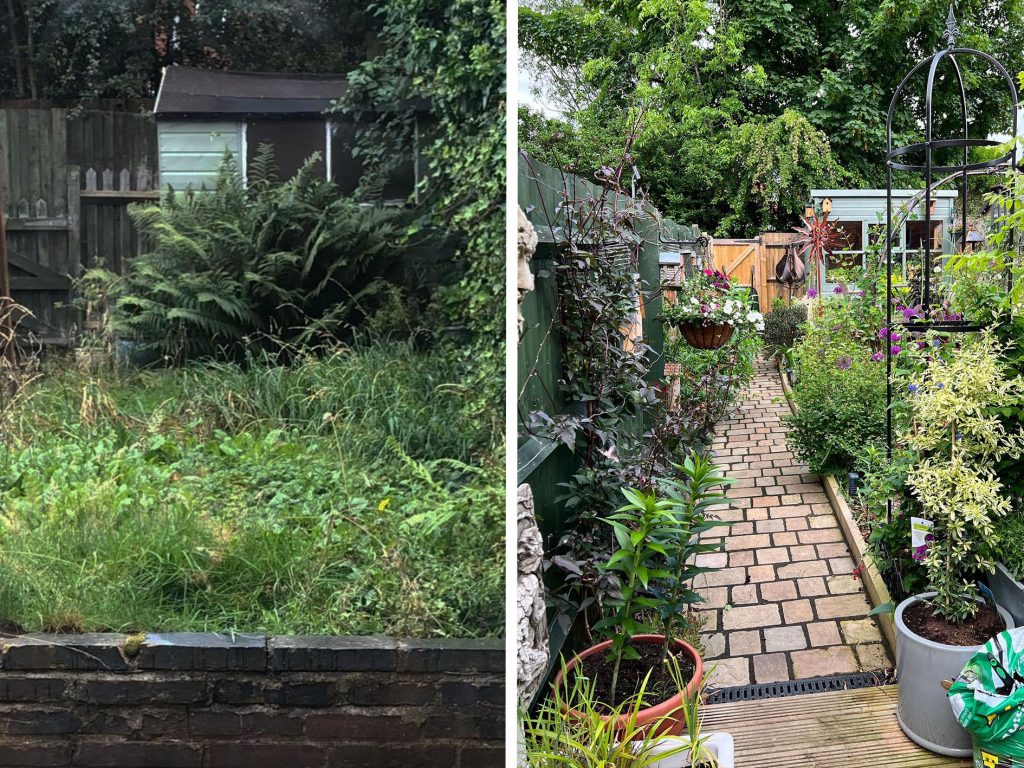
“Gardening is a definite medicine. It helps distract me from the unwanted negative feelings and feel normal and safe in my own environment. To my surprise, I’ve found myself already planning for spring. And finding things I can do now – just little things like filling the bird feeders.
“I think it has huge potential as part of treatment alongside more conventional methods.”
Over 1,200 people in Cardiff are on the waiting list for an allotment. Cardiff Council says it is identifying sites for new allotments and working with charities to improve access to them.
Through social prescribing, care providers in Wales can refer patients to gardening schemes like Grow Well, a “health and wellbeing community garden project” covering Caerau, Canton, Ely and Riverside.
“There is a growing evidence base that being outside in natural environments can help to relieve stress and anxiety, and taking part in activities with a group regularly helps to reduce isolation, give a sense of purpose and build self-esteem,” Grow Well explain.
The benefits do not expire once the volunteers leave the garden. Gardening is like planting a seed that grows and then blossoms into a healthier lifestyle.
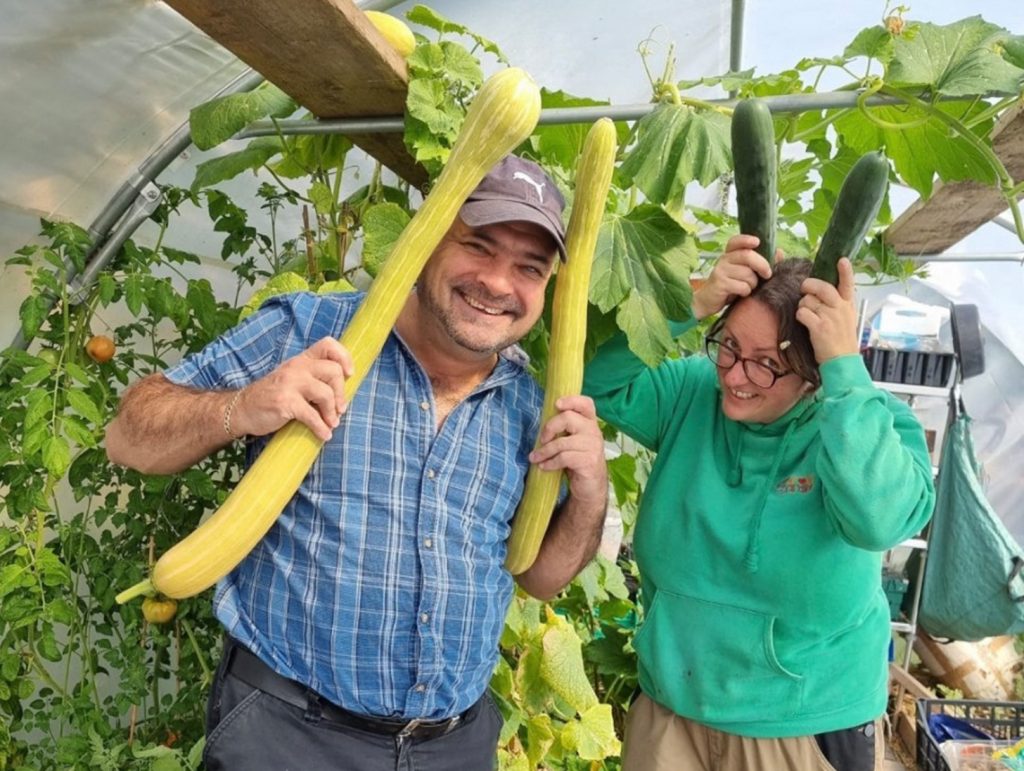
“Access to a wider range of fruit and vegetables that we grow ourselves can improve people’s diets or encourage experimentation with different foods that people wouldn’t usually try.
“Sleep can also become easier after a rewarding day spent outdoors.”
Community activities such as gardening could also help to relieve the frontline services of the NHS.
“Social prescribing could help ease the pressure on more front-line specialist services,” says the Welsh Government. More than 25,000 people in Wales benefitted from social prescriptions in 2020/21, more than double the number from two years prior. It will take savvy resourcing, like the use of gardening, to relieve the NHS from its own pressure.
We tend to talk about living in harmony with nature in terms of us looking after it. Lest we forget that nature looks after us – the perfect remedy to modern life. We should not be afraid to use it.
If you need to talk to someone, call Samaritans for free at 116 123.


